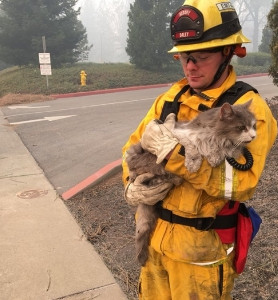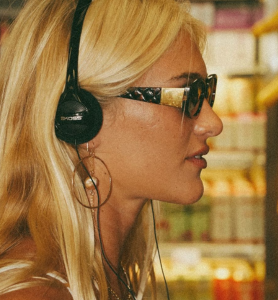Coco’s Cantina—a Karangahape Road Icon
Coco’s Cantina is an institution—co-founder Renee Coulter (Ngāti Kahu) has no shortage of people reminding her. On a gloomy Thursday, the restaurant is closed to passersby, but there’s already a hum in preparation for the weekend ahead. James is here to check on the tap wines, one of many changes Coco’s has made to improve their carbon footprint. The sparky hasn’t come, the POS system’s being triple checked after a well-timed outage last night, and there’s still herbs to be picked from the garden. Being owner-operated is a tough balance for anyone, but Coulter makes it look natural. 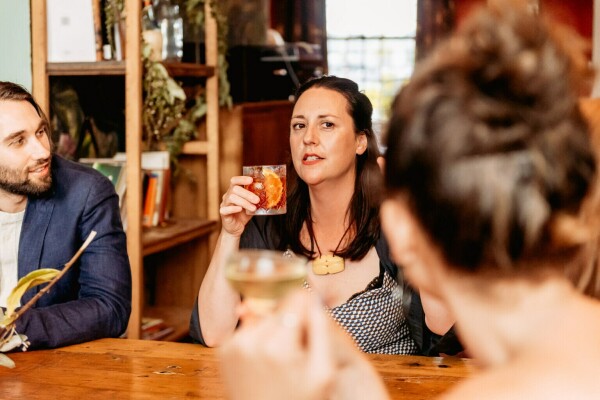
Karangahape Road’s dining scene looked very different in 2009, when Coco’s first opened its doors as ‘Mister Morning’. “At that stage, there wasn't that many cafe and daytime offerings. There wasn't the million—Daily Daily, Open, Bestie, Fort Greene—all of the great places that we've got now. So that made sense at the time,” Coulter explains. Unfortunately for the morning birds, she, alongside co-founder and sister Damarius Coulter, hated getting up early. “Our preferred service is looking after people when they've finished work, when they're ready to have a drink, when they want to let their hair down a little bit.” 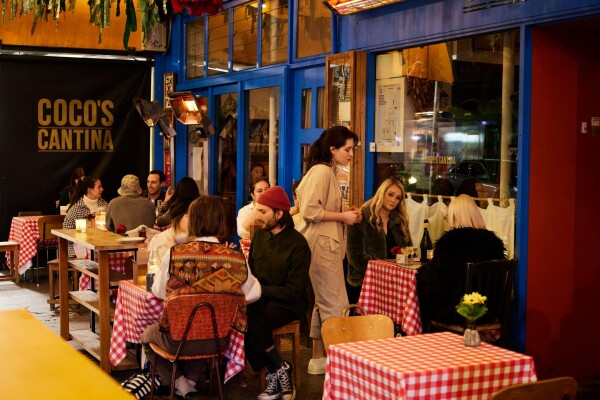
Via Coco’s Cantina
So, in a natural evolution for their wants and needs, the sisters pivoted to Coco’s. Trust and partnership between host and guest has always been important, as they started the restaurant on a strictly walk-in model—a risky move at the time; “There's a partnership in that handshake— I know you don't have a booking, but you are going to get fed, I'm going to make it happen, you're going to see me juggle, and enjoy the show.” The homely vibe—from the music to the way you’re greeted, served, and farewelled—has always been the goal for Coco’s, no different to what you might experience at a dinner party. For Coulter, hospitality doesn’t stop at serving food and drinks. It’s about the people—including the ones beyond the restaurant’s doors.
“That manaaki doesn't just start and stop when you come in the front door and you walk out the back door. We try to push our walls further out so that we are in touch with our neighbours. We make this part of Karangahape our responsibility. [...] The car park is still my responsibility, West Terrace is still my responsibility, because we are on someone else's whenua.” If someone needs a cuppa, a slice of pizza, she provides, and implores her team to do the same. Other times, that means taking on the less glamorous jobs, like sweeping away cigarette butts and picking up pie wrappers. 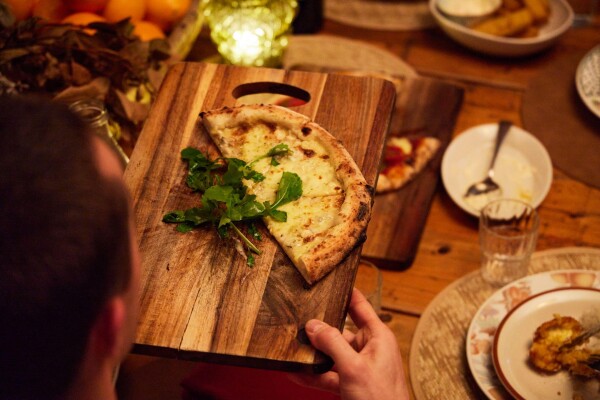
Via Coco’s Cantina
Coco’s iconic Polenta with Purpose weaves this kaitiakitanga into your meal. For every bowl of polenta you order (and you really should, it’s delicious), $1 goes into the pot to be split between five rotating charities. Currently, they’re supporting RainbowYOUTH, Auckland City Mission (via DineAid), Lifewise, Orange Sky New Zealand, and NZPC’s Karangahape branch. Like many things at Coco’s, this initiative was born out of wanting to support their community, and making the admin a little easier for the team. DineAid is a popular way for diners to help give back by adding on a dollar to the bill, but Coulter and her team were finding that the format wasn’t quite working for their customer base. “A lot of our guests split the bill. We have a lot of young people and they're paying by item, so what’s another way we can do this?” Polenta was the common denominator, ordered by nearly every table, and so the initiative was born—all the collective table has to do is put $1 into the pot. Last year they raised $5,000 despite a tough year for the industry, success that’s thanks to a perceptive, inventive team led by an owner who listens.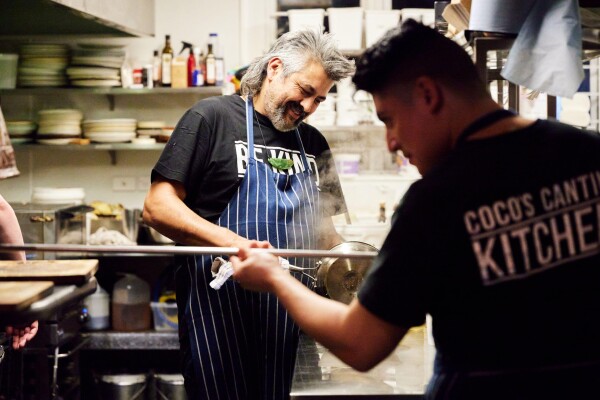
Via Coco’s Cantina
You’ll often see Renee working the floor on a Saturday night—not a place many hospitality owners put themselves in. Coming from a strong front of house background, it’s only natural she helps support her team on all fronts. That being said, it’s not easy to be owner-operated in the current climate—try balancing the books, pumping out great food, maintaining stellar service, and keeping the restaurant beautiful, all while Kiwis are dining out less. Add in raising kids to the mix, and you’ve really got a packed calendar. How does she do it all? Well, she’s not alone: head chef and co-owner Emile has two sons, and back of house manager Odette has a daughter. “I think when you have other key people in your business at the same life point as you, that's really helpful.” They take the wins where they can, from taking a pizza home for the little ones to enjoying the moments many nine-to-fivers can’t. “I'm lucky. I go to all the athletics, I go to all the swimming sports, I do some coaching, all of those things because I'm around in the daytime. There are things that you miss out on. But, when you've got a strong team behind you, like we have here, we just take turns.”
Anyone that’s worked in hospitality knows how wasteful it can be. Endless packaging binned, flimsy takeaway boxes, eye-wateringly expensive meals wasted, the list goes on. They’re negative connotations, but Renee notes they’re not unfair ones. Though they’ve started counting their carbon, few other restaurants do the same, so there’s no real benchmark. However, the team at Coco’s does nothing if not adapt. They simply drew a line in the sand, looked at what they could change, and tried it. Change they have—a majority of their wine is organic and on tap now, a shift Renee’s particularly proud of (don’t worry, they taste just as good). They’ve taken it all the way down to the candles on the tables—electric, cutting out the packaging the wax candles came in, and certainly less of a fire hazard after you’ve had a few. Putting sustainability at the forefront has been a massive passion for Renee, but she understands it’s a privilege that not all businesses have, especially today. “That's why I would like more collaboration amongst the industry and support from the government. Auckland Council, and all councils—they have a place to play here too.”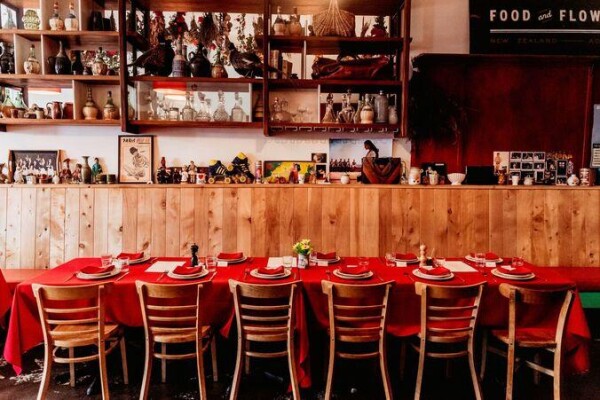
Via Coco’s Cantina
Despite pandemics, a recession, and every mini crisis a restaurant faces in the middle of the rush, she is nothing but grateful and passionate for her team and space. “Having a business is fucking hard, but there are some wins. You do get these little moments where you think, I'm really lucky to have this freedom, I'm really lucky to be in a place where I can put my ideas and creativity through.” Few restaurants have crafted the sense of community that flows out of Coco’s, and makes it look remarkably natural. For those who want to take a page out of their book, Coulter has some advice—just start, and be realistic. Being a sustainable, philanthropic, community-based business takes a village. “We've done litter cleanups, we cook meals that go down the road to Lifewise, and the things that have stuck are things that are achievable. When we've gone too big then it feels like a drag, and you don't want it to feel like that. You want it to feel like part of your everyday —and it can't just land completely on the owner or the key people in the business. It has to be things that can get shared out amongst the whole team, and then they just become part of the mise en place. They're just part of the day to day.”
Finally, who is Coco? As Coulter puts it, anyone is. “You could be Coco. We all are Coco. Everyone who works here is Coco.” It’s simply about embodying that feminine energy, and that sense of community; “It's our restaurant, it's your restaurant.”



